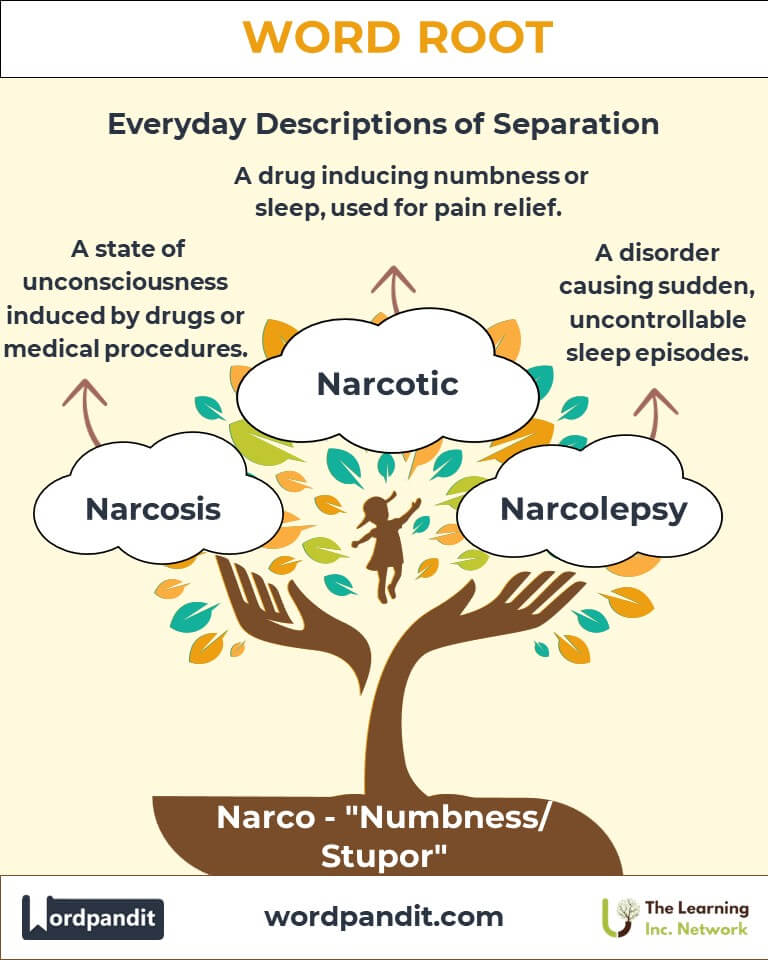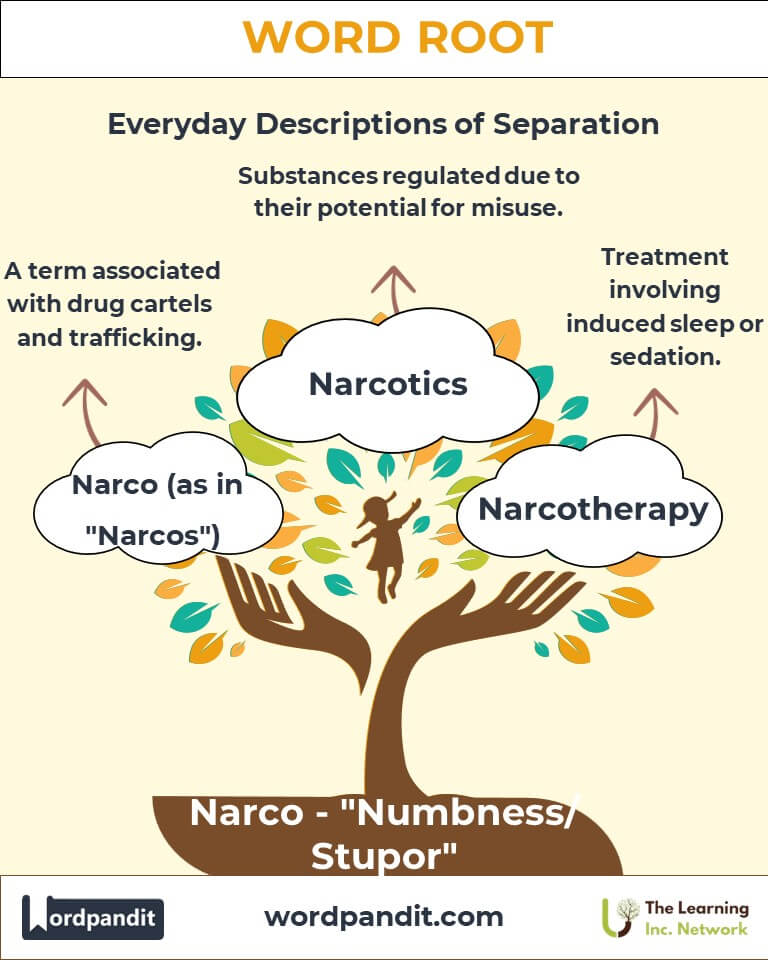Narco: The Root of Numbness in Language and Medicine
Byline: Explore the intriguing root narco, derived from Greek, meaning "numbness" or "stupor." This root underpins terms that connect to sleep, sedation, and altered consciousness, such as narcotic and narcosis. From medicine to law enforcement, narco influences many fields and continues to shape how we describe states of mind and body.

Table of Contents
- Introduction: The Essence of Narco
- Etymology and Historical Journey
- Mnemonic: Unlocking the Power of Narco
- Common Narco-Related Terms
- Narco Through Time
- Narco in Specialized Fields
- Illustrative Story: Narco in Action
- Cultural Significance of the Narco Root
- The Narco Family Tree
- FAQs about the Narco Word Root
- Test Your Knowledge: Narco Word Root Quiz
- Conclusion: The Living Legacy of Narco
Introduction: The Essence of Narco
The word root narco, pronounced "nahr-koh", originates from the Greek word narkē, meaning "numbness" or "stupor." This evocative root gives rise to words that describe sedation, unconsciousness, and altered perception, like narcotic and narcosis. Its applications span medicine, psychology, and even law enforcement, reflecting humanity's complex relationship with sleep, drugs, and altered states.

Etymology and Historical Journey
The root narco has ancient Greek origins, with narkē describing numbness or torpor. Hippocrates used it to describe states of physical and mental sedation. The root entered Latin as narcosis, maintaining its medical connotation, and later evolved into modern English with terms like narcotic for substances inducing stupor and narcosis for induced unconsciousness.
Mnemonic: Unlocking the Power of Narco
Imagine a person slipping into a deep sleep under the spell of a magical narcotic flower. This imagery ties the root narco to its essence: inducing numbness or sleep.
Mnemonic Device: "Narco numbs like a spell, drawing you into a stupor or sleep."
Common Narco-Related Terms
-
Narcotic (nahr-kot-ik):
- Definition: A drug inducing numbness or sleep; often used for pain relief or illicit purposes.
- Example: "Morphine is a powerful narcotic used in pain management."
-
Narcosis (nahr-koh-sis):
- Definition: A state of unconsciousness induced by drugs or medical procedures.
- Example: "The patient was placed under narcosis for the surgery."
-
Narcotherapy (nahr-koh-ther-uh-pee):
- Definition: Treatment involving induced sleep or sedation.
- Example: "Narcotherapy was once used to treat certain psychological disorders."
-
Narcolepsy (nahr-koh-lep-see):
- Definition: A disorder causing sudden, uncontrollable sleep episodes.
- Example: "People with narcolepsy may fall asleep at inappropriate times."
-
Narcotize (nahr-koh-tahyz):
- Definition: To administer drugs that induce stupor.
- Example: "The medication was used to narcotize the patient before the procedure."
Narco Through Time
- Narcotic (Ancient to Modern): Originally referring to substances that relieve pain or induce stupor, it now includes illicit drugs like opiates.
- Narcosis (Historical Evolution): Initially a medical term, it expanded into diving terminology, describing "nitrogen narcosis" caused by high-pressure environments.
Narco in Specialized Fields
-
Medicine: Narcosis is essential in surgeries to safely induce unconsciousness.
- Example: "General anesthesia relies on controlled narcosis."
-
Law Enforcement: Narcotics denote substances regulated due to their potential for misuse.
- Example: "The narcotics division focuses on combating drug trafficking."
-
Psychology: Narcolepsy highlights the root's connection to sleep disorders.
- Example: "Research into narcolepsy has advanced treatments for this condition."
Illustrative Story: Narco in Action
In a bustling city hospital, Dr. Elena prepares a patient for surgery. Administering a narcotic to alleviate pain, she monitors their narcosis closely. Meanwhile, across town, Detective Cruz investigates a narcotics ring, uncovering how these substances circulate illegally. Both professionals grapple with narco's dual nature: its ability to heal and its potential for harm.
Cultural Significance of the Narco Root
The root narco holds dual significance in modern culture. It evokes images of healing in medicine but also conjures darker associations with narcotics abuse. In media, "narcos" refers to drug cartels, as popularized by shows and books exploring the global drug trade.

The Narco Family Tree
- Somn- (Latin: sleep): Insomnia - the inability to sleep.
- Hypno- (Greek: sleep): Hypnosis - a trance-like state.
- Torpo- (Latin: numb): Torpor - a state of physical or mental inactivity.

FAQs About " Narco "
Q: What does "narco" mean?
A: The root "narco" means "numbness" or "stupor" and originates from the Greek word narkē. It describes states of sedation, unconsciousness, or insensibility, often used in medical or psychological contexts.
Q: What is a narcotic?
A: A narcotic is a drug that induces sleep, relieves pain, or causes a state of numbness. While narcotics have therapeutic uses, particularly in managing severe pain (e.g., morphine), they can also be addictive and are subject to regulation due to potential misuse.
Q: How does "narcosis" differ from "narcotic"?
A: Narcosis refers to a state of unconsciousness or deep stupor, often induced intentionally for medical purposes (e.g., during surgery). A narcotic, on the other hand, is the substance used to produce such effects.
Q: What is nitrogen narcosis?
A: Nitrogen narcosis, sometimes called "rapture of the deep," is a condition experienced by deep-sea divers when nitrogen builds up in the bloodstream under high pressure. It causes euphoria, confusion, and impaired judgment, similar to the effects of narcotics.
Q: What is narcolepsy?
A: Narcolepsy is a neurological disorder characterized by sudden and uncontrollable episodes of sleep during the day. It is not related to narcotics but shares the root narco due to its connection to sleep and numbness.
Q: What is narcotherapy?
A: Narcotherapy involves using induced sleep or sedation to aid psychological treatment or recovery. Though less common today, it has historically been used for trauma or mental health conditions.
Q: How is "narco" related to law enforcement?
A: In law enforcement, narco is shorthand for narcotics and often refers to divisions that handle drug-related crimes. Shows like Narcos have popularized the term in the context of drug trafficking.
Q: Are all narcotics illegal?
A: No, not all narcotics are illegal. Many, like morphine or codeine, are used in medicine for pain relief. However, misuse or possession without a prescription can make their use unlawful.
Q: How has the term "narco" evolved in popular culture?
A: The term "narco" has become synonymous with drug cartels and the illegal drug trade, largely due to media and shows like Narcos. It also highlights the dual nature of narcotics as both lifesaving medicines and dangerous substances.
Test Your Knowledge: " Narco " Mastery Quiz
1. What does "narco" mean?
2. Which term describes a disorder causing sudden sleep?
3. What is narcosis?
4. Which field uses "narcotics" extensively?
5. What is nitrogen narcosis often called?
Conclusion: The Living Legacy of Narco
The root narco illustrates humanity’s complex relationship with numbness and sedation, balancing medical benefits with societal challenges. As science advances and global drug policies evolve, narco remains a vital linguistic and cultural element, embodying both healing and cautionary tales.














